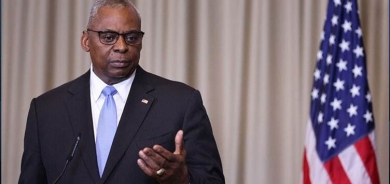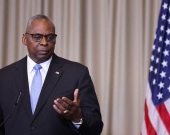Egypt’s Suleiman denies army support; says Islamists sent him death threats

Omar Suleiman, 74, announced his candidacy on Friday and showed he still wields political clout by collecting around 72,000 signatures of eligible voters in one day, more than twice the 30,000 required. The deadline for submitting signatures was Sunday, according to Reuters.
Suleiman’s military background suggested to many that he had the backing of the ruling army council that took over from Mubarak in February last year.
“The supreme council has no relation, neither negatively nor positively, with my decision to join the race for the presidency,” Suleiman said in an interview published in the state’s al-Akhbar, the private al-Osboua and al-Youm al-Sabea newspapers on Monday.
“And indeed, as soon as my nomination for the presidency was announced, I received on my personal mobile and through some people close to me death threats and messages saying ‘we will take revenge’ from members of the Muslim Brotherhood and other Islamist groups,” he added.
Suleiman, made vice president by Mubarak in the last days of his three-decade rule, symbolizes that era’s tough security regime and poses a threat to Islamists, who were routinely harassed and arrested during Mubarak’s era, and to liberals, who spearheaded Mubarak’s ouster. But his candidacy might appeal to some Egyptians hoping for an end to political instability.
Insult to revolution
His 11th-hour decision to run for president came shortly after the Muslim Brotherhood, the Islamist movement long suppressed by Mubarak and now in control of a parliament majority, broke a pledge not to field a candidate and nominated its deputy leader, Khairat al-Shater, for head of state.
In an interview with Reuters on Sunday, Shater denounced Suleiman’s bid for his former boss’s job.
“I consider his entry an insult to the revolution and the Egyptian people,” said Shater, who said he spent 12 years in jail during the Mubarak era. “Omar Suleiman has made a big mistake. He will only win through forgery and, if this happens, the revolution will kick off again.”
The support of the Brotherhood’s formidable campaign machine makes Shater an immediate front-runner.
Members of the Brotherhood were not available to comment on Suleiman’s accusation that he received death threats from them.
The military council has said it will hand power to civilians after a presidential election due in May and June. Around 23 candidates qualified to run for head of state and most of the top contenders are Islamists or Mubarak-era politicians.
Asked about Egyptians who view his nomination as an attempt to reproduce the Mubarak regime they ousted, Suleiman said: “Let us say that you cannot turn back the clock. The revolution has formed a new reality ... and no one could ever revive a regime that has failed, ended, and was rejected by the public.”
“And I have told the Egyptian youth and many others with whom I have met during the revolution period that I am in favor of their legitimate demands,” he added.
Islamists determined to monopolize posts
If he were to win, Suleiman said he would not interfere in the trials of any of the members of the former regime. Mubarak and some of his top officials are on trial for charges related to the death of over 800 protesters during the uprising and for corruption. The final verdict in Mubarak's case is due on June 2.
Suleiman said he was encouraged to run for the state’s top post because he felt the Brotherhood’s popularity has fallen due to “their determination to monopolize all posts.”
The current constitution that gave absolute powers to the president was suspended by the army shortly after the toppling of Mubarak.
Suleiman said he could not accept the presidency if the constitutional committee decides to give more power to the parliament than the president.
“I would never agree to be just an image. The head of state has to have real power, and I think that the country is in need of a strong president who would bring stability and security.”
Like most of his rivals, Suleiman vowed to bring security back to the streets, aid Egypt’s distressed economy, implement democracy and respect all international treaties.
During the Egyptian uprising Suleiman had said in an interview with ABC that Egyptians were not ready for democracy. His comments turned against him the millions of Egyptians who had campaigned for weeks for an end to Mubarak’s rule.
“Egypt will always be and continue to be a national democratic state where its children enjoy full rights,” Suleiman said in Monday’s interview.
Mubarak No. 2
Many Egyptians have since lost faith with the young revolutionaries who engineered Mubarak’s stunning overthrow. The euphoria over his ouster soon gave way to frustration as Egyptians struggled to cope with a surge in violent crime, the fallout from a faltering economy and seemingly endless strikes, street protests and sit-ins that disrupted their daily life.
“There is a real constituency that now yearns for law and order and stability after the tumultuous period following the fall of the Mubarak regime,” Michael Hanna, an Egypt expert from the Century Foundation in New York, told The Associated Press. “Many among this sector will view him as a force for such stability in the face of rising chaos and economic uncertainty. But his inextricably tight connection to the former regime and some its most repressive practices will also limit his support.”
“I can say with certainty that the (ruling) military council pushed Omar Suleiman to run,” declared moderate Islamist candidate Abdul-Moneim Abul Fotouh, according to AP. “I can’t imagine the Egyptian people will elect a figure from the old regime.”
“We will not leave our hands tied in face of Omar Suleiman’s candidacy. We will start the escalation tomorrow,” Ammar Bakkar, the spokesman of the Salafi al-Nour party, wrote on his Facebook page on Sunday.
“Omar Suleiman is in fact Mubarak No. 2,” said Khaled Ali, a presidential candidate representing liberal and leftist groups.
Suleiman is not the only Mubarak-era figure running for president. The ousted leader’s last prime minister and fellow air force officer Ahmed Shafiq is one, and so is Amr Moussa, who was Mubarak’s foreign minister for 10 years.
AL ARABIYA














